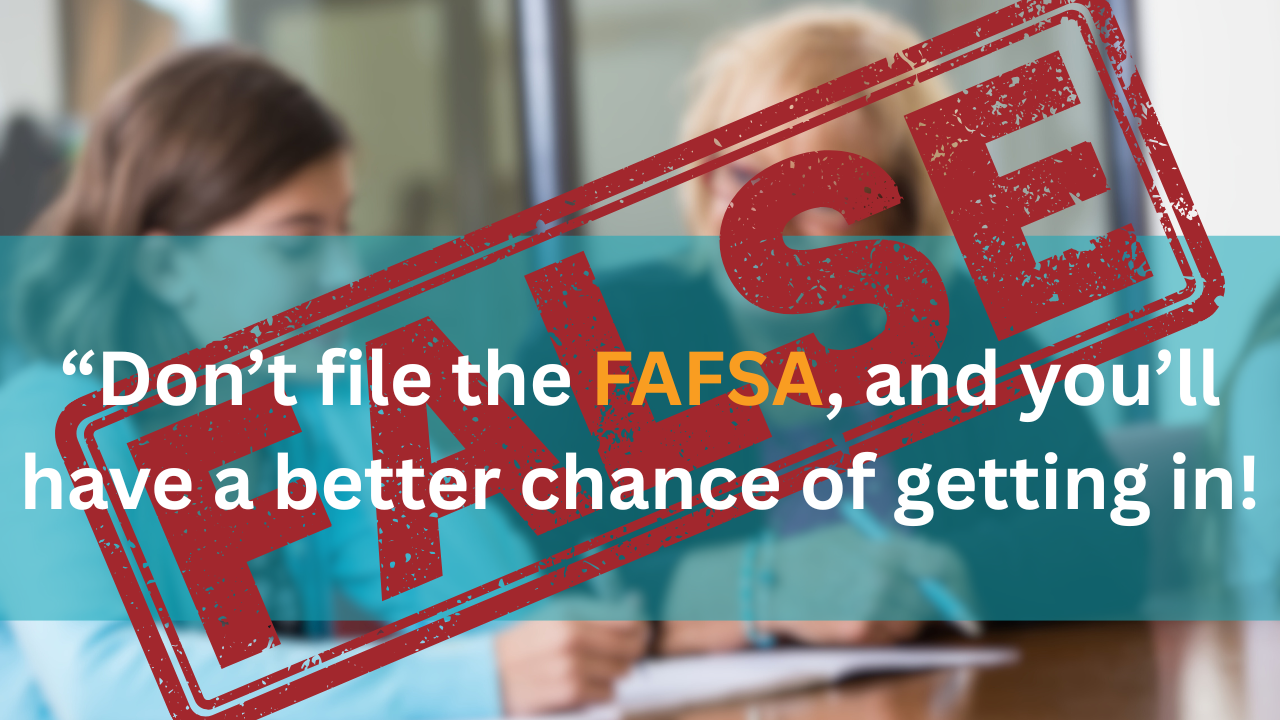FAFSA Mythbusting: Does Not Filing Help You Get In?
Oct 03, 2025
Does Not Filing the FAFSA Help You Get Into College?
We’ve had two different parents ask us this question in the past week:
“Someone told me that if we don’t file the FAFSA, our student might have a better shot at getting into college.”
Short answer? No. Please don’t do that. Longer answer? Let’s break it down.
TL;DR
Skipping the FAFSA doesn’t help your child get accepted—and it can seriously limit your options later. Filing keeps doors open for scholarships, loans, and special circumstance appeals if life throws a curveball. Think of it like an insurance policy for college funding.
🚨 Where This Rumor Comes From
Some folks believe that by not filing the FAFSA, a college will assume you’re paying full price and might reward you with an acceptance letter. That could sound logical—if colleges were businesses trying to accept only the biggest spenders.
Here’s the truth: most colleges are need‑blind. They don’t even see FAFSA info during admissions. A small number are “need‑aware,” but even there, skipping the FAFSA rarely helps and usually just limits your options.
🧨 Why Skipping the FAFSA Can Backfire
We’ve seen real families in tough situations—names changed, stories true:
- A dad—sole breadwinner—ended up in a coma and the ICU for six months as his daughter started college.
- A mom of four diagnosed with breast cancer, unable to work for a year.
- Another student lost his mom unexpectedly just two months before starting school.
These families received little aid based on their original FAFSA—but because it was on file, we were able to step in and request a Change in Circumstances review.
📘 What’s a “Change in Circumstances”?
It’s a formal process (also called a “special circumstance appeal”) where you tell the college, “Hey, the info on our FAFSA no longer reflects our reality.” This could be due to job loss, illness, divorce, death, or even natural disasters.
“But I don’t think that will ever happen to me.”
According to NASFAA, 1 in 3 college students will face a change in circumstances that negatively impacts their family’s ability to pay for college. When you consider there are millions of students starting college every year, that’s a big number.
Better to file it and not need it than to have something unforeseen happen and not be able to get consideration because it isn’t on file. Think of it like an insurance policy.
We’re based in Los Angeles, and in just the past few years we’ve seen major events—landslides, the Malibu and Altadena fires. Some of our clients in Pacific Palisades never saw aid from the FAFSA, and they certainly didn’t expect they were going to lose their homes in a matter of days. But they were sure glad we insisted that they fill out the FAFSA because the schools can now help them.
🔒 No FAFSA = No Flexibility
- Some merit scholarships require a FAFSA on file.
- You can’t get federal student loans without it.
- You lose the ability to appeal later if something changes.
- Schools may view your file as incomplete when managing aid.
Filing the FAFSA doesn’t mean you’re asking for a handout. It means you’re doing your homework.
💸 But What If I *Can* Afford Full Price?
That’s great! But wouldn’t it still be nice to have options?
We’ve had high‑income and high‑asset families qualify for unexpected aid because:
- There were assets that could be excluded or disqualified.
- Our tax team found creative (and legal!) ways to lower AGI.
- They had special circumstances—like real estate portfolios, business ownership, or divorce/separation—that could be used to lower their Student Aid Index.
You might not need help today, but you’ll sure wish you had it ready if things go sideways tomorrow.
📥 Need a Checklist?
Want to make sure you’ve got everything ready before you file? We put together a simple, printable FAFSA checklist to walk you through what you’ll need—documents, IDs, deadlines, and a few things most families forget.
📄 Download the 2026–2027 FAFSA Checklist
No form, no email required. Just good info, from one family to another.
📝 Final Word
File the FAFSA—even if you think you won’t qualify. It does not hurt your student’s chance of getting in. It gives you more options, flexibility, and peace of mind. And if life throws a wrench your way? You’ll be ready to respond.
If you need help, we’ve got checklists, strategies, and a team that’s done this for thousands of families (ours included). This stuff can be complicated, but you don’t have to figure it all out alone.
“Do you need some help with that?”
